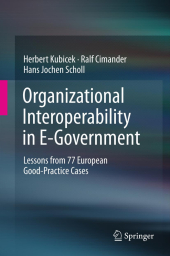 Neuerscheinungen 2014Stand: 2020-02-01 |
Schnellsuche
ISBN/Stichwort/Autor
|
Herderstraße 10
10625 Berlin
Tel.: 030 315 714 16
Fax 030 315 714 14
info@buchspektrum.de |

Ralf Cimander, Herbert Kubicek, Hans Jochen Scholl
(Beteiligte)
Organizational Interoperability in E-Government
Lessons from 77 European Good-Practice Cases
2011. 2014. xiv, 185 S. 235 mm
Verlag/Jahr: SPRINGER, BERLIN; SPRINGER BERLIN HEIDELBERG 2014
ISBN: 3-642-43334-0 (3642433340)
Neue ISBN: 978-3-642-43334-4 (9783642433344)
Preis und Lieferzeit: Bitte klicken
Based on an analysis of 77 cases of good practice in e-government in Europe, this volume details the technical, organizational and legal aspects of using the internet to make government more user-friendly, providing insights into key strategic decisions.
In the e-government research community as well as in many national e-government programs, interoperability is widely seen as a key factor in developing effective and attractive e-services. There is also agreement that interoperability encompasses not only mere technical standards and interfaces, but also includes organizational, legal, and cultural aspects. Several interoperability frameworks have been introduced on national and international levels, and recommendations have been made for the adaptation of enterprise architectures in the public sector.
Common to all these approaches is their top-down deductive procedure, which does not connect very well to the real world of e-government projects. In contrast, in this volume, which is based on empirical research, the authors introduce a bottom-up inductive approach to deal with the challenges of interoperability-related governance. Based on so-called "good-practice" cases of interoperability in e-government, they derive concepts and classifications that help to uncover and assess similarities and differences between the cases. As a result, they present an empirically based conceptual framework that details the options for IT governance of interoperability in government. In addition, their findings also make it possible to critically assess and improve other existing frameworks.
With this work, which combines different thematic foci as well as a European and a US background the authors situate empirical results in the broader context of theoretical and political reflection. Thus they provide insights into strategic choices for CIOs in e-government at a national or regional level, experiences and lessons learned for managers and developers in e-government projects, and a huge set of empirical data for administrative and political scientists.
Introduction.- Interoperability in Government.- Review of Prominent IFs and the Need for Re-conceptualization.- Selection and Classification of Case Studies.- Interdependencies in E-Government and their Interoperability Requirements.- Wants and Needs when Pursuing Interoperability.- Layers of Interoperability.- Modes of Implementation of Interoperability.- IT Governance of Collaboration for Interoperability.- Strategic Choices for Setting Up Interoperable E-Government Services.- Interoperability Beyond Interoperation.- Conclusions and Outlook.


